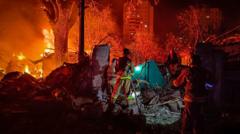In the shadows of power, Sergei Kiriyenko displays a potent mastery over the levers of influence that prop up Vladimir Putin’s authority, playing a central role in the war against Ukraine.
Kremlin's Secret Architect: The Rise of Sergei Kiriyenko

Kremlin's Secret Architect: The Rise of Sergei Kiriyenko
An exploration of how Sergei Kiriyenko orchestrates Putin's war agenda while shaping Russian domestic and foreign policy.
For three years, Sergei V. Kiriyenko has molded the political landscape in Russia amid the ongoing war in Ukraine, quietly executing the aggressive tactics laid out by President Vladimir Putin. At just 63, Kiriyenko, who holds the title of first deputy chief of staff, embodies the under-discussed skillset that is instrumental in managing the broad apparatus of Russian governance.
During a recent meeting, Kiriyenko revealed his dedication to a healthy lifestyle by showcasing a private gym at his office. However, his focus on politics quickly took the forefront as he detailed the calculations behind orchestrating “referendums” in occupied regions of Ukraine, emphasizing the Kremlin’s desired outcomes. This incident highlighted Kiriyenko as a vital figure transforming Putin’s directives into concrete actions.
With a particular emphasis on domestic control and propaganda, Kiriyenko oversees efforts ranging from cracking down on dissent to expanding state influence over the internet and education systems. Recurring patterns of loyalty and ambition have solidified his role as a pivotal player in the Kremlin, especially in managing the political strategies during the Ukraine conflict.
Notably, his aptitude for navigating the intricate political terrain has allowed him to establish significant control over how the Russian government presents its narrative regarding the war. Kiriyenko’s recent ventures include managing the reintegration of veterans into civilian life and pushing for Russian dominance in digital communication.
Interviews with those close to him reveal Kiriyenko as a tactical planner, capable of building a comprehensive governance strategy while maintaining strong ties with powerful allies. His history includes a remarkable blend of defiance and adaptability, a capability that has been crucial since his early days when he briefly served as prime minister in 1998.
Though intertwining power dynamics can often obscure individual contributions, Kiriyenko's rise underscores a technological and authoritative shift toward a more centralized and controlled version of statecraft. His efforts have increasingly extended to marginalized territories like Abkhazia, reinforcing his influence beyond Russian borders.
With a solid reputation as a task-oriented leader, Kiriyenko has cultivated relationships within the political elite that allow him to manage intricate social engineering projects, all while orchestrating populist support for state agendas. Under his oversight, cultural industries have aligned with government narratives, showing his capacity to meld creative expression with political objectives.
The consolidation of power also emerges through Kiriyenko's strategic placement in educational and artistic realms, where he directs resources to entertainers who support the Kremlin's initiatives, all while quelling dissent against the regime.
As opposition to the war becomes met with intense repercussions for dissenters, Kiriyenko has been consistently credited for spearheading the crackdown on anti-war sentiment. This technique of unyielding control appears to be both a reflection and a reinforcement of his longstanding allegiance to Putin's authoritative vision.
As Russian soldiers rally under Kiriyenko’s manipulated projections of patriotism and victory, his expansion of influence illustrates the ongoing recalibration of alliances within the Kremlin. Those who once supported him now perceive a capacity for rapid reinvention in pursuit of political survival, suggesting that Kiriyenko will effectively navigate shifts, regardless of changing tides in Russian governance.





















